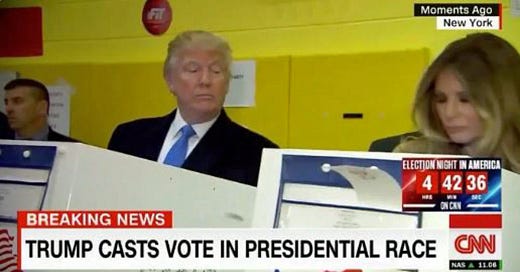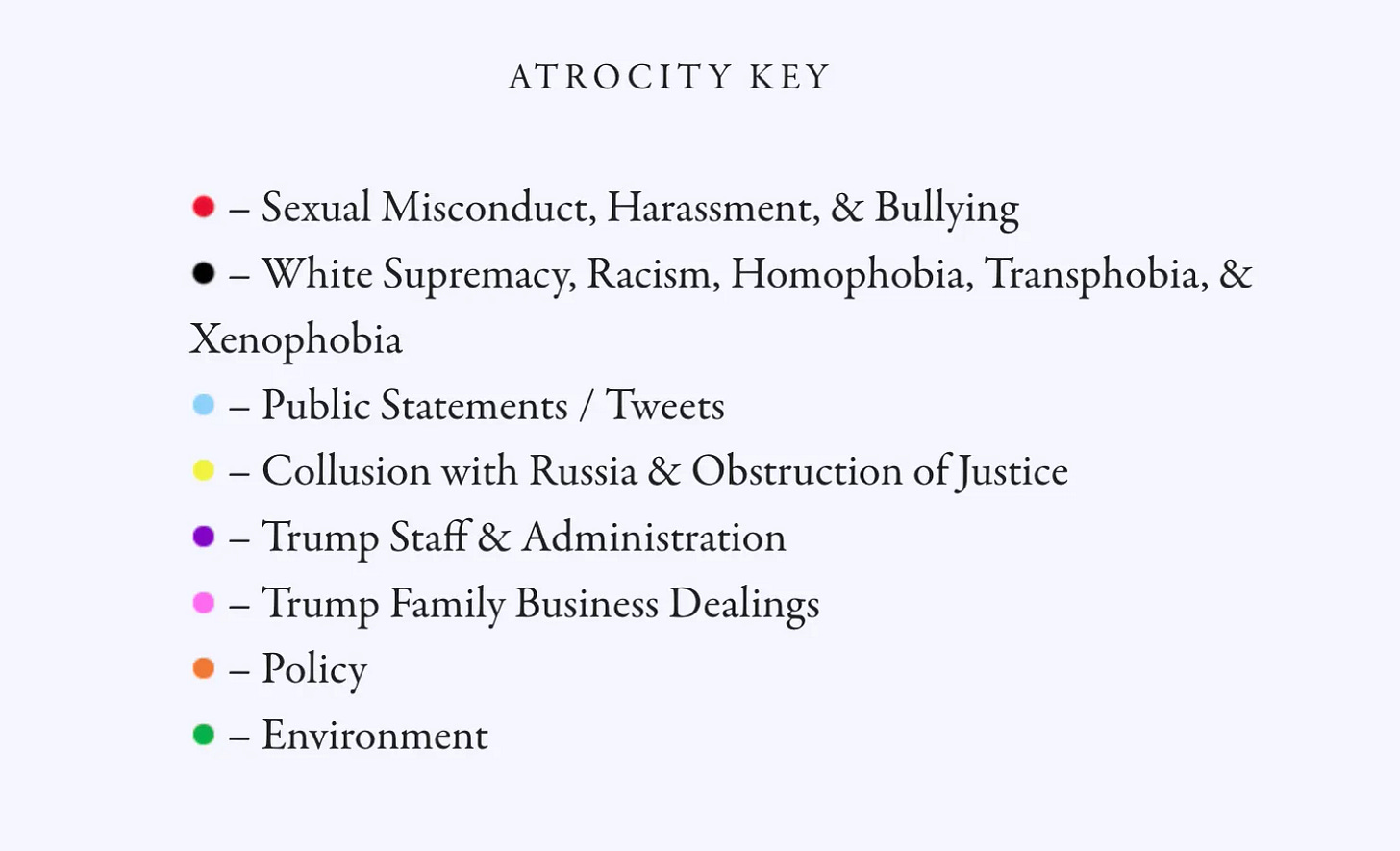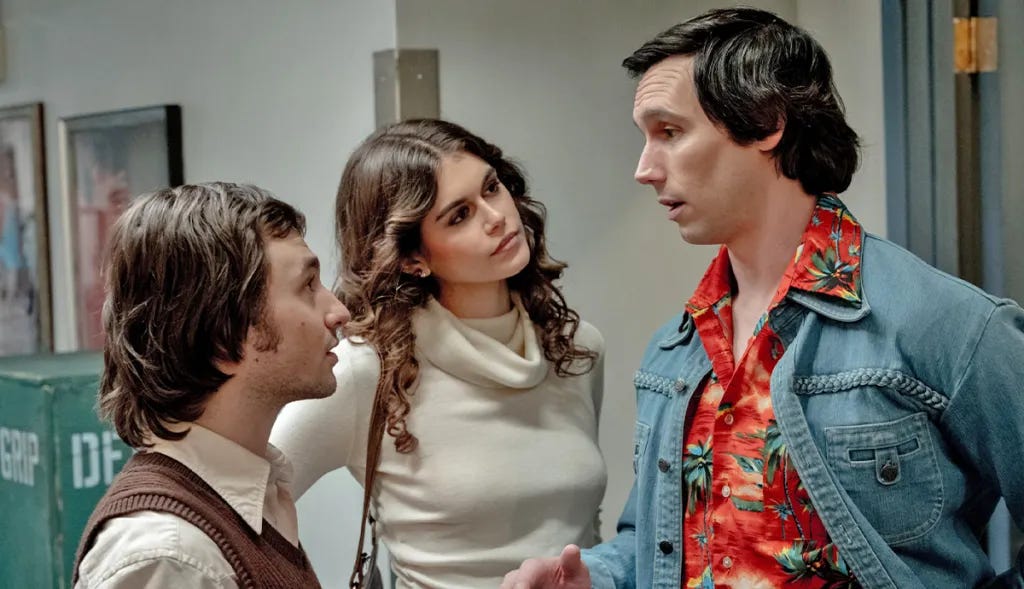Volume 5, Issue 42: Pine Barrens
"Captain or no captain, right now, we're just two assholes lost in the woods."
Here is a button where you can subscribe to this newsletter now, if you have not previously done so. I do hope that you enjoy it.
It is a longstanding tradition—one, that goodness, has now gone on for more than eight years—that, in an even-numbered election year, I write an electoral endorsement post. Here’s 2016, and here’s 2018, and here’s 2020, and here’s 2022. This year, during a time when there is nothing most people want to talk about less right now than politics, I have decided to write two.
The first, today’s, will attempt to grapple, hopefully one last time, with the Trump era. Next week’s will be an endorsement of his opponent, Vice President Kamala Harris. In a race this close, I find it inadequate to simply argue why one should vote against Trump; it’s important to make what I believe to be a compelling case specifically for her as well. So next week: Her. This week: Him.
When Donald Trump won the Presidential election (but of course not the popular vote) in 2016, the one thing everyone seemed to agree upon—including, it turned out, Trump himself—is that it felt like an accident. I remember attending a school event the Monday before Election Day back then, and even Republican friends (who, I suspect, ended up voting for him anyway) were openly mocking the notion that he could possibly win. His victory felt, when you took a bird’s eye view of it, like an absurd, unrepeatable set of circumstances: A historically unpopular opponent, a last-minute surprise in the release of the Comey memo, Hillary Clinton’s decision not to actively campaign in Wisconsin (and her particular struggles in the Upper Midwest and Pennsylvania), people voting for Trump out of protest but never thinking he would actually win, and (perhaps mostly) widespread complacency resulting in a lack of engagement and passion from the incumbent party that never seriously thought it could lose. Trump did win the Electoral College, but he still lost by nearly three million votes, in an election in which only 55 percent of Americans actually bothered to vote, the lowest turnout in 20 years. You could almost persuade yourself that this wasn’t supposed to be happen, that it was a black swan event that it would unfortunately take four years to correct, particularly as his chaotic and, do not forget, entirely terrifying Presidency unfolded under forever-plummeting approval ratings.
I had not been overtly political in any sort of outgoing way before 2016, partly because I was covering the 2016 election professionally and partly for the same reasons most people aren’t overtly political: I don’t particularly enjoy fighting with people all the time. The Trump years have sent us to our corners, our little silos, for so long that it’s easy for forget that your neighbor is not supposed to be your enemy, that being able to disagree with someone but still get along with them was the default state for most of our lives—in fact a foundational tenet of living in a democracy. I believed what I believed, and I stood up for those beliefs, but I did not think that merely having those beliefs entitled me to blast them in everyone’s faces all the time, or, more important, to damn anyone who didn’t share them. I didn’t vote for Mitt Romney or John McCain, but I admired both men and did not feel some moral obligation to stand in fervent opposition to them.
Trump was, immediately, different. It was clear, from the beginning, that this was a man who could not have possibly stood in harsher contrast to what I valued in a politician, or really a human being. I’ve long thought one of the fascinating aspects of Trump is that there are so many loathsome things about him, you can actually learn a little about a person by what bothers them most about him. Is it the racism? The misogyny? The firehose of lies, so relentless it feels like a Tourettic tic? The strongman tendencies? The general boorishness? There is so much to choose from that you can be as specific as you want. I have friends who were picked on in high school who hate him because he is a bully; my father hates him because he doesn’t pay his contractors; an old professor of mine is most repulsed by his lack of intellectual curiosity, how everything and everyone seems to get a little bit stupider just by being exposed to him. For me, it has always been the shamelessness, the sense that if you are impervious to the judgment of others, that if you charge forward and never apologize, if you just push and push and push until normal people just get out of your way so they can just get on with their lives, you can get away with anything.
(I wrote about this using the analogy of a man cutting the line at a car rental place back in July 2018.)
But honestly: You can take your pick. I often refer back to McSweeney’s invaluable “Lest We Forget The Horrors,” in which every single bit of Trump monstrousness was catalogued, in intricate detail, so that it did not vanish from the public record. There were so many that the page actually had an “Atrocity Key.”
Trump was, for me, too much to stay silent about, less for myself and more for my kids, who were too young in 2016 to truly understand what was happening. When I watch documentaries or read magazine stories about the civil rights era, or the Cuban Missile Crisis, or Watergate, I can’t help but wonder what my parents were thinking when they were living through it, as they experienced it, rather than looking back on it now through a retrospective lens. I did not want my children, when they looked back at the Trump era, to have to guess what their father was thinking during what will be known forever as one of the most tumultuous moments in American history. When they are adults, and they conjure up vague memories of being a kid while Trump was President in the same way I can conjure up vague memories of Reagan being President, I don’t want them to have any doubt: Their father stood against Donald Trump. I don’t think my stance against Trump had any tangible impact on the world, or was particularly brave or noble, or that I changed anybody’s minds. But my kids—they would know. When they were in their 50s, and they watched a show about the Trump era, they’d remember: “Man, Dad couldn’t stand that guy.” I even wrote a cover story for New York about this very thing. My boys could never say, “Dad was OK with that.” I didn’t want there to be any doubt, ever, the rest of their lives.
But there was one understanding implicit in all of these thoughts and discussion: Someday, the Trump era would end. It would be something my kids looked back on … not something they would still be living through the ramifications of. The grand reflection and reckoning I imagined, the collective what the hell was that about? that I assumed we’d all be doing once we ultimately corrected the 2016 mistake, would be a tidied up in a neat little package to be easily disposed of. Sure, there would be remnants of Trump and his movement (whatever that even means, as if there is any there are sort of cohesive philosophy or policy stances about anything) still around for decades to come, I was under no illusions about that. But it still felt like it would be have to be over, someday, and my kids would be able to look back upon it from a better, or at least entirely different, future. When Trump lost in 2020—in a result that, it should not be forgotten, was much, much closer than anyone thought it would be—and, particularly, after the horrors of January 6, I thought that would be the door slamming shut on the Trump era. Maybe he would go to jail, maybe he’d just randomly wander around the halls of Mar-a-Lago for the rest of his life, but he would no longer be a daily presence in every one of our lives. He’d still lurk. But there was only so much he could do. We had survived it. The system held.
I did think this, I really did.
But now, now that we are just two weeks away from Trump essentially a coin flip away from becoming President again—and, if that coin flip doesn’t go his way, promising to fight and claw and lie his way to sow even more disorder in a way that may be even worse than last time—I find it difficult to find comfort in any notion that this was any sort of accident.
I look at Trump and see the worst of humanity, and the worst of America, a man with no redeeming qualities, who cares about nothing other than his own aggrandizement and personal wealth, who has so many aggrievements, so much rage, that his core is simply an empty maw that can never be filled. But 46 percent of the voters of this country, this country I love, many of them my neighbors, some of them beloved family members, have looked at that very same man, and the way he acts, the vindictiveness, the threats, the cruelty, the ridiculousness, the fundamental unseriousness, the way he treats people, the example he sets for my children and their children and all children … after all that they have seen, or all that they have chosen not to, and they have said, “Yes, this is what I want. Give me more of this.”
This is not an easy circle for me to square.
Originally, I had planned for this newsletter to be a plain-spoken, earnest, good-faith attempt to address arguments that people, including many people I know, make for voting for Trump. I was going to attempt to rebut them. If you think Trump is going to make your taxes lower, well, unless you are among the top 0.1 percent of richest Americans, he won’t. If you think he’s going to keep bad people out of the country, well, immigrants actually commit crimes at a far lower rate than the rest of the population (also, not for nothing, but thinking they don’t is, uh, the textbook definition of what racism is?) and, more to the point, Trump early this year himself blocked a tougher border bill that was the sort of bipartisan tough immigration agreement that everyone claims they want. If you think he will bring inflation down (which is already happening), his plan on massive tariffs on imports (Thursday, he called “tariff” a “more beautiful word than love”) is universally expected by economists to “lead to higher costs, stock market volatility and feuds with the rest of the world.” If you think Trump will promote Christian values … I’m sorry, I couldn’t actually finish that one with a straight face.
I could sit here all day and try and throw a bunch of facts at people. I could try to appeal to their emotions, to a sense of decency, to look at sort of world they want for children that I know they love deeply. I could talk about Trump’s threats to democracy, about how much he could, and even desires to, dismantle the sorts of foundational tenets that both my grandfathers fought for, that millions of American soldiers died for. (Soldiers Trump himself has no respect for.) I could make the argument that even a dedicated Republican who isn’t all-in on Trump but voted for Reagan and Bush and McCain and Romney and wants the party to return shouldn’t vote for Trump, that if you consider yourself a Nikki Haley Republican, the best thing that could happen for Nikki Haley and the rest of the party (and the rest of the country) would be for Trump to lose. I could direct you to this terrific Jonathan V. Last piece, which, in ways smarter than I can muster, digs into every rationale for voting for Trump and why each one is either irrational or based on presumptions that are simply not true. (Damon Linker has a great piece making the case for “normie” Republicans to vote for Harris so they can go back to being normal Republicans again as well.) I could go on and on. I suppose I sort of already have.
But what can be said that hasn’t? What more can anyone say about this man? What more can he show us? I have attempted to understand why 46 percent of the country, again, a country I deeply love, would vote for him, and I have failed. Do I think this means they are bad people? That they are fools? That I am somehow smarter than they are? I do not think this means any of those things. I am my own person, with my own beliefs, my own blind spots, my own biases, like everyone else on the planet. I cannot see what is in another person’s heart, just like they cannot see what’s in mine.
It must be said, however: That 46 percent of this country looks at that man and believes it will be better off if he is its leader … I do not know how to square that circle. If Trump wins this election, knowing that my children understood that their father stood against him will be of little solace. It will not do anyone—particularly my kids, and all the kids who will have to fix the mess we will have made for them, if there is anything even left to fix—any good whatsoever.
It will just simply be too late. If it isn’t already.
(Next week: The case for Harris—specifically.)
Here is a numerical breakdown of all the things I wrote this week, in order of what I believe to be their quality.
I Wrote About the Knicks Because I Think Way Too Much About the Knicks, New York. This time of year? Constantly.
Ranking the Four Potential World Series Matchups, MLB.com. I think the Yankees-Dodgers series is cooler than the Yankees-Mets series. (And Guardians-Mets is closer to both of them than people might think.)
Cate Blanchett Movies, Ranked, Vulture. Updated with Rumours.
The Twenty Best Movies About American Presidents, Vulture. Not updated with The Apprentice.
Your League Championship Series Power Rankings, MLB.com. These go a lot quicker when there are only four teams.
Your Friday MLB Preview, MLB.com. OK, this week: Rambo movies! 1. First Blood (1982).
Your Thursday MLB Preview, MLB.com. 2. Rambo (2008).
Your Wednesday MLB Preview, MLB.com. 3. Rambo: First Blood Part II (1985).
Your Tuesday MLB Preview, MLB.com. 4. Rambo III (1988)
Your Monday MLB Preview, MLB.com. 5. Rambo: Last Blood (2019)
PODCASTS
Grierson & Leitch, we reviewed “Saturday Night,” “The Apprentice” and “La Haine.”
Waitin’ Since Last Saturday, we recapped the Mississippi State game and previewed today’s exciting Texas game.
Morning Lineup, I did Monday and Wednesday morning’s shows.
Seeing Red, no show this week.
LONG STORY YOU SHOULD READ THIS MORNING … OF THE WEEK
‘I literally can’t stop.’ The descent of a modern sports fan,” Jason Quick, The Athletic. Putting aside what it’s doing to sports itself, sports gambling—and, specifically, apps created to prey on the addicted—is destroying lives and families across the country. Here’s an illustrative and haunting story.
Also, I’m not sure it’s possible for me to love this Rodger Sherman piece on the Army-Navy game—and just how much (and how little!) it might mean this year, and how college football claims to love the Army-Navy but purposefully shoved it aside for solely economic reasons—any more than I do.
ONGOING LETTER-WRITING PROJECT!
This is your reminder that if you write me a letter and put it in the mail, I will respond to it with a letter of my own, and send that letter right to you! It really happens! Hundreds of satisfied customers! (I’m sorry I’m so behind on these. But I am starting to catch up!)
Write me at:
Will Leitch
P.O. Box 48
Athens GA 30603
CURRENTLY LISTENING TO
“Spud Infinity,” Big Thief. After all that Trump business, I need a song that has a 100 percent hit rate at putting me in a good mood. This one will do it. It puts much silly joy in my life.
Remember to listen to The Official Will Leitch Newsletter Spotify Playlist, featuring every song ever mentioned in this section.
Also, now there is an Official The Time Has Come Spotify Playlist.
Did my final long run this morning, 20.6 miles. We’re two weeks away from the marathon. I almost made it through a whole newsletter without mentioning it.
And I’m back in time to root on the Illini in the biggest football game they’ve played in … a decade? Which I could be there.
GO. ILLINI.
Best,
Will








Bravo. Great essay. I am a 70 year old white Georgian who was a preteen during the Jim Crow era and remembers Klan rallies in Atlanta. I was into current events during the Civil Rights Era and the Vietnam War. I have observed that the American mood become worse than anytime in my life beginning when Trump came down the escalator in 2015. Trump gave license to people to HATE other regular people and 46% of the country took him up on it. Trump has given elected officials license to make up lies to their constituents that endanger their constituents. For example, Jake Tapper played Trump actually naming Adam Schiff as an enemy of the people in the sentence referencing the need for the National Guard or military for Virginia Governor Youngkin and Youngkin actually denied Trump had mentioned any elected official!
Trump's destruction of our national soul is the worst of his many offenses. The nation can survive 4 years with a marginal tax rate that is too low or to high. It cannot survive the psychological affect on the American people
Everything about Trump and that he actually has a chance of becoming president again completely breaks my brain in ways almost nothing has in my entire life. It mostly makes me incredibly sad.